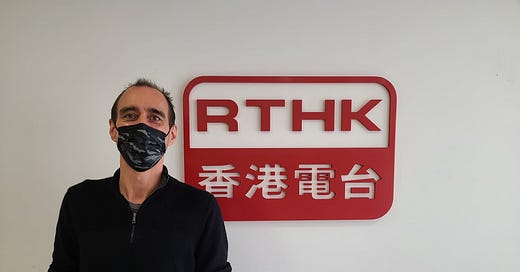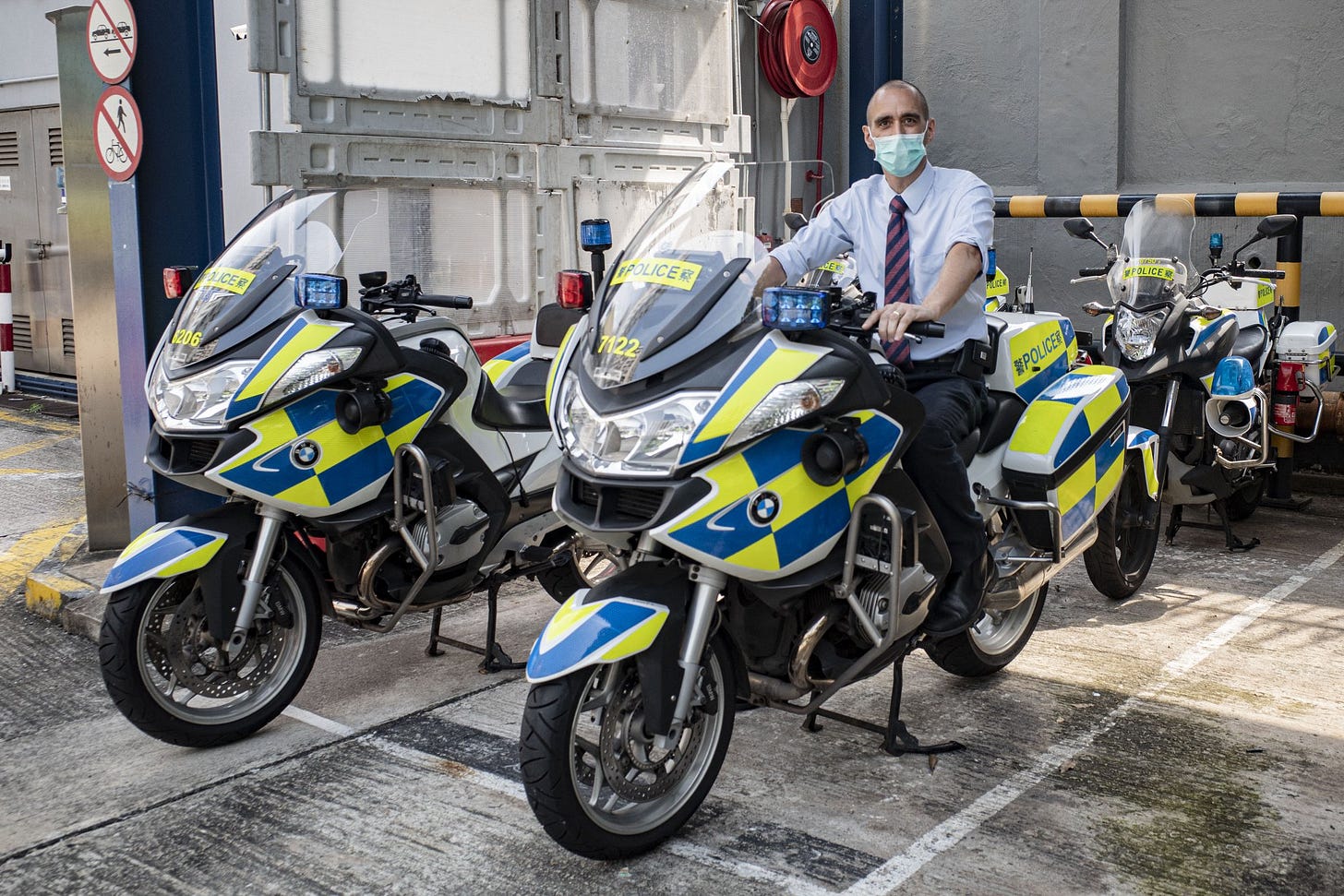Kick Out the Jams
On the busy streets of Hong Kong, one-man newspaper Transit Jam is shining a light on the city's shamefully poor record on providing road safety for cyclists and walkers
Meet James Ockenden, the founder, editor and author of online site Transit Jam, which he describes as 'Hong Kong’s first and only registered newspaper dedicated to sustainable transport' (I don’t doubt it). I came across his website via Hong Kong Free Press, my go-to source for independent, unbiased news on the city (a rarity since the enactment of national security legislation almost two years ago). Transit Jam occupies a niche, only reporting news on sustainable transport and almost entirely written by Ockenden himself. Intrigued, I reached out to ask what led him to launch his own newspaper, how he keeps up the prolific output, and where his interest stems from.
So tell me about Transit Jam, how did it come about?
A couple of years ago I was arrested for ‘obstructing a public official’ - I’d complained about an FEHD cleaning truck driving onto the pavement and narrowly missing my kids. I complained to the FEHD officer on board, and she said, “If you don’t like it call the cops”, so I did call, and when they showed up she told them I was obstructing the FEHD officer in her duties and they arrested me! With my kids... total abuse of power.
I spent nine hours in Central police station, had my phone seized, the usual nonsense. I was never charged but needed to report back monthly for six months. And I thought, there’s absolutely no local media holding government accountable for these things. There’s a really strong media presence in Hong Kong for political stories, but for this situation, as just one example, nobody was really interested. And as I did a bit of digging into road safety, I found something like three road deaths that week that had not been reported anywhere in English media, so I figured there was a gap I could fill.
How do you keep up your fairly prolific output of stories?
I’ve been a journalist for 30 years, and these are very short stories. I can bash them out pretty quick once the facts are in. I’m a “full time dad” so I don’t have time to do long form analytical pieces or major feature stories, but I can make calls and raise hell with government departments on the phone with the kids in tow, and then write it up in no time. The only challenge for me is press conferences: after a while the government stopped allowing me in with kids, they said it was disruptive. I argued that they were better behaved than the photographers... but they’re barred.
What do you hope readers get from reading Transit Jam?
The quality and scope of English-language environmental and transport reporting in Hong Kong is shockingly bad, with a few exceptions, so I hope to fill that gap and improve overall the conversation in the city on transport issues. And part of that is holding government and organisations accountable, which means questioning them, not being afraid of hard questions, not cosying up to anyone (be they government or environmental organisations), so I hope readers will get an objective view of the real situation on Hong Kong’s roads.
I think before Transit Jam came along, English-speaking residents had no idea of the sheer number of road injuries and deaths every week. The victims are usually 70-year-old women in poor neighbourhoods, and the way they are usually portrayed is just not interesting to South China Morning Post (SCMP) readers, as an example. But because Transit Jam consistently covers every road death, adds context and hopefully trends and patterns, when there’s a tragedy SCMP would be interested in, it doesn't come out of the blue so much. Regular Transit Jam readers can see it as part of a pattern, are better informed and can perhaps take some steps to address the issues.
What was ‘Wham Bam Tram’, and is it still running?
Wham Bam Tram was a two-season radio show we did on RTHK Channel 7, it’s more “big picture” CityLab sort of discussions about sustainable transport. It was a great show, we’re hoping to shift it to Radio 3 some time later this year. I also wrote and produced a drama for the show, Alphard Wars, which was pretty funny (to me anyway!), a bit of satire on the ridiculous police priorities in Hong Kong.
What does HK do well when it comes to transport?
We honestly have excellent public transport. You’ll see the “90% of journeys are by public transport” bandied around in every government speech. Hong Kong people also walk more than anyone else in the world, largely due to this public transport, and I have a theory (backed up by Peter Walker’s excellent book The Miracle Pill) that this explains Hong Kong’s world-record longevity.
Part of the problem today is that the government has rested on these laurels, allowed unfettered car growth, failed to plan for public transport in new areas, and basically taken its eye off the ball on road safety.
Is there a district in HK which does better than others?
Yuen Long has the right idea, it’s like Berlin with the light rail trams and protected cycle paths, housing blocks very close to the light rail stops and wide pavements. But sadly the utopia is a mess: illegal parking and obstructions on the cycle paths and breaks in the cycle paths every 20 metres mean people don’t actually use them! Pedestrians use the cycle paths because of the poor quality pavements, which means cyclists use the road, and sadly several lost their lives in 2021.
What are the three biggest issues with HK transport?
Car growth is the biggest issue: parking should be priced properly (currently, it seems illegal parking is cheaper than getting a parking space). The police appear to be accepting triad law in places like Tsim Sha Tsui, allowing them to use public roads and public parking meters for gang profit, it’s insane.
The government also seems to prioritise vehicles in all its planning. We’re losing much-needed pedestrianisation schemes, and even at-grade pedestrian crossings are being phased out, making journeys on foot longer and more arduous, all to give cars a speedier passage.
And speed limits are far too high. Reducing urban speed limits to 30kph would make streets much safer and encourage more walking and cycling.
Speaking of cycling, what is the ‘ghost bike’ project?
This was a personal project to highlight the number of rider deaths in Hong Kong. The cycling community worldwide usually commemorates these with the annual Ride of Silence, but HK police have refused permission and harassed even small groups of riders meeting for that event, so I wanted to do something else.
Of course, police removed all eight ghost bikes within a week of them being deployed, citing road safety concerns. I’m still chasing police for a proper explanation, and am pretty angry they removed bikes safely chained at the roadside but left behind bikes rusted to the railings or smashed-up cars illegally parked on the road... but so far police are sticking to the line that random patrols just happened to find all eight bikes independently and each decided to remove them. That’s nonsense, of course.
It doesn’t matter though, the memorial work was in the research of the crashes, the preparation and deployment of the bikes, it's been pretty popular on Instagram @hkghostbikes and raised a lot of awareness despite their brief lifespan.
If you could introduce anything to HK's transport network, what would it be and why?
E-cargo bikes. Or just plain cargo bikes, but I think with some of the gradients, a laden cargo bike would need some power-assist. These are a big hit in London and other cities.
I live in Phnom Penh, where Grab is huge and licensed taxis are non-existent. It's a user-friendly model that really works. What are your thoughts on Grab, Uber and the like?
I've interviewed Uber a few times. And you need to fact check everything they say very carefully. I did an investigation into Uber when it claimed all its cars had proper hire licences, and I found something like 99% did not. And despite what they claim, those cars are not properly insured, so passengers are putting themselves at risk. I don’t use Uber myself, it’s very much more expensive than public transport and I don’t like the “point to point” transport, I like to walk a bit. For readers interested I’d recommend Ali Griswold’s Oversharing newsletter for smarter comments on Uber.
How do you personally get around HK most of the time?
With my kids, it’s walking, train, and minibus. On my own, walking, train or bicycle, depending if I need to cross the harbour. Getting a bike to HK Island is a pain. I bought a car last year as our apartment had a parking space, quite interesting getting the driver perspective, but I’ve only put petrol in it about three times. Driving in HK is horrible, so many complex highway junctions, very poor GPS, plus now being aware of the danger of speed, it’s just not fun! I have a little chime warning set to 30kph, above which is very dangerous for pedestrians, so I kinda stick to that or below on most urban roads, I get a lot of angry people behind me and I don’t enjoy it one bit!
Curious about the story title? It’s a reference to the excellent song by ‘70s Detroit band MC5:







A great article about a great organization. Sadly there is not enough emphasis given to pedestrianization and car reduction, though the likes of Transit Jam and Paul Zimmerman's Designing Hong Kong do well. I suppose car ownership is till quite cheap here and the mind-set is firmly in favour of that. Funnily enough I was given a company car when I first arrived, though soon discovering that various buses plied the routes I needed to in a much more restful and economical manner, I ditched the thing asap ! It worked out well, company gave me an increase as compensation and Hong Kong was rewarded with one less car (it was scrapped in the end) ! Win-win.
So interesting for so many different reasons.